WOLFWALKERS (2020)
A young apprentice hunter and her father journey to Ireland to help wipe out the last wolf pack. But everything changes when she befriends a free-spirited girl from a mysterious tribe rumoured to transform into wolves by night.
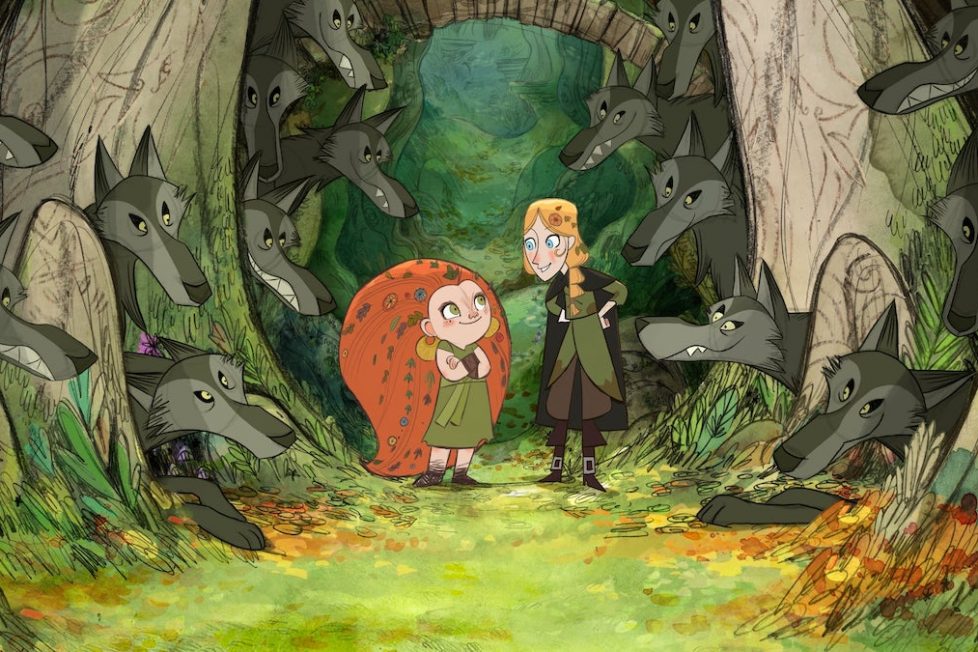
A young apprentice hunter and her father journey to Ireland to help wipe out the last wolf pack. But everything changes when she befriends a free-spirited girl from a mysterious tribe rumoured to transform into wolves by night.


It’s rare these days to find a reputable studio dedicated to hand-drawn animation, especially in an industry now saturated by digital artistry. With the release of the first Shrek (2001), as well as Disney’s gradual transition to CGI and live-action, 2D animation finds itself in a place where its future seems uncertain and inaccessible. A handful of animators have, of course, stayed behind to preserve and uphold its legacy, such as veteran animation monoliths like Studio Ghibli or stalwart independents like Don Hertzfeldt. But the avenue for 2D’s continued success is gradually becoming more niche.
Enter the Irish dark-horse animation studio known as Cartoon Saloon, a company that’s displayed shockingly rapid growth with four Academy Award-nominated films under their belt. Starting with The Secret of Kells (2009) and forging a hot streak with Song of the Sea (2014) and The Breadwinner (2017), Cartoon Saloon’s films have received consistent acclaim for combining cultural literacy with spellbinding hand-drawn animation. Almost all of their work has featured fantasy elements derived from distinct — mostly Irish—cultural backgrounds, creating stories that are simply perfect for animation as a medium.
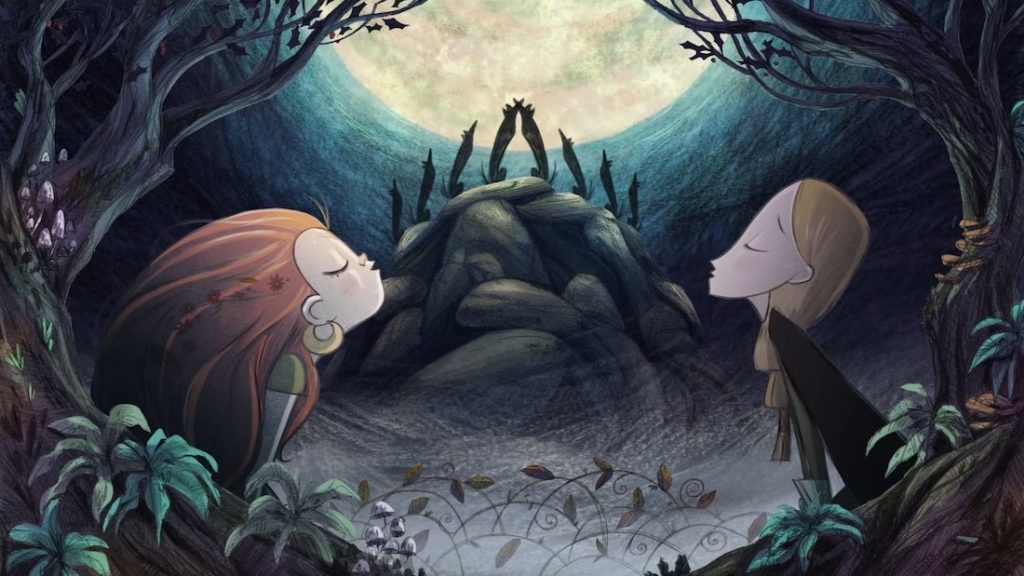
Cartoon Saloon’s been developing their style of animation and storytelling for the better part of a decade, and it’s clear how much they’ve allowed it to grow and change over the years. Their newest feature, Wolfwalkers (directed by studio co-founders Tomm Moore and Ross Stewart) feels like a proper culmination of all this effort. It may well be their most maturely created work thus far, with surprisingly lush, meticulously crafted visuals working in tandem with a fascinatingly thorough understanding of Irish mythology. It’s an incredible breath of fresh air and a reminder of how much human effort can truly be invested in works like these. There’s so much evident passion in not just the mythos-rich, cathartic storytelling, but also the film’s overall painterly look and feel, both of which beautifully evoke an irreplaceably distinct world and atmosphere.
Wolfwalkers is set in an alternate fantasy rendition of 17th-century Kilkenny, Ireland, a town overtaken by Lord Protector Oliver Cromwell (Simon McBurney), who’s walled off the city entirely to the surrounding forests. Cromwell wants to clear the woods for farming purposes, putting him directly in the path of mystical wolves who block his attempts at every turn. In charge of hunting these beasts is Bill Goodfellowe (Sean Bean) and his daughter, Robyn (Honor Kneafsey), brought directly from England to Kilkenny for this exact purpose.
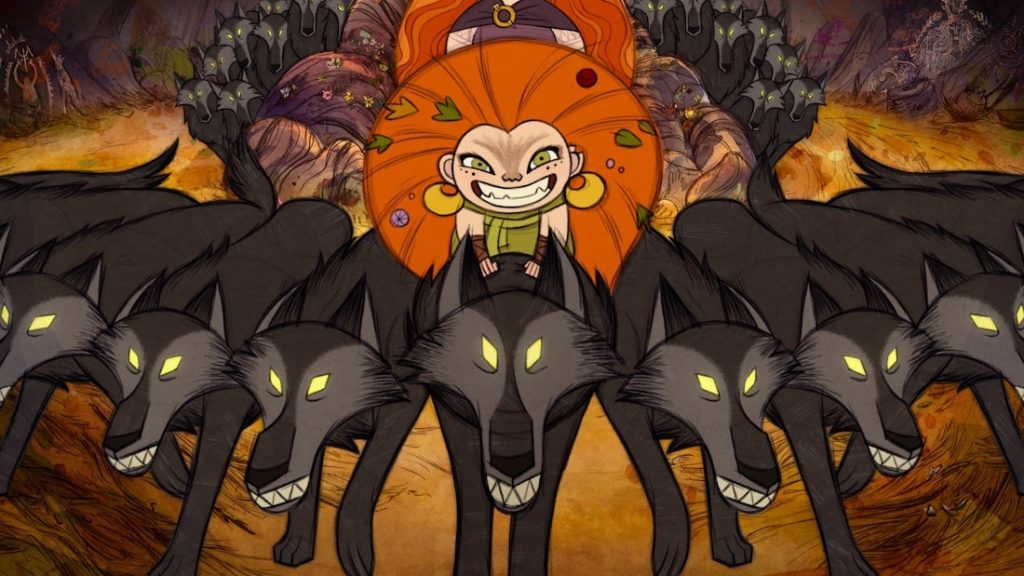
Robyn and Bill find themselves as unwelcome foreigners in an already restrictive land, and they both react to their circumstances in different ways. While Bill unquestioningly obeys Cromwell’s numerous orders, expecting his daughter to do the same, Robyn is much more rebellious, keenly wanting to become a hunter like her father. She repeatedly resists the work that people expect her to fulfil, and occasionally sneaks out of the village to observe her father’s hunting practices.
It’s this desire that leads Robyn to cross the Kilkenny walls one day and head out into the woods on her own. In the process, however, she stumbles upon the wolves’ ornate den and their de facto leader—a magical, impulsive “wolfwalker” (a werewolf in all but name) named Mebh MacTire (Eva Whittaker), whose mother, Moll (Maria Doyle Kennedy), is seemingly in a comatose state. What follows is an incredibly mystical journey as Robyn bonds with Mebh and the wolves, discovers the wolfwalkers’ boundless magic, and uses their powers to stand up to the injustices around her.
Firstly, Wolfwalkers‘ distinct characters are brought to life by some of the best vocal performances of the year, led by both veteran actors and new talents. Honor Kneafsey and Eva Whittaker—who portray Robyn and Mebh, respectively—have enormous amounts of chemistry together and are excellent at distinguishing their characters’ vastly disparate personalities. Kneafsey fittingly captures Robyn’s defiant yet altruistic spirit, while Whittaker elevates Mebh’s quirky, uninhibited, and quite literally animalistic disposition.
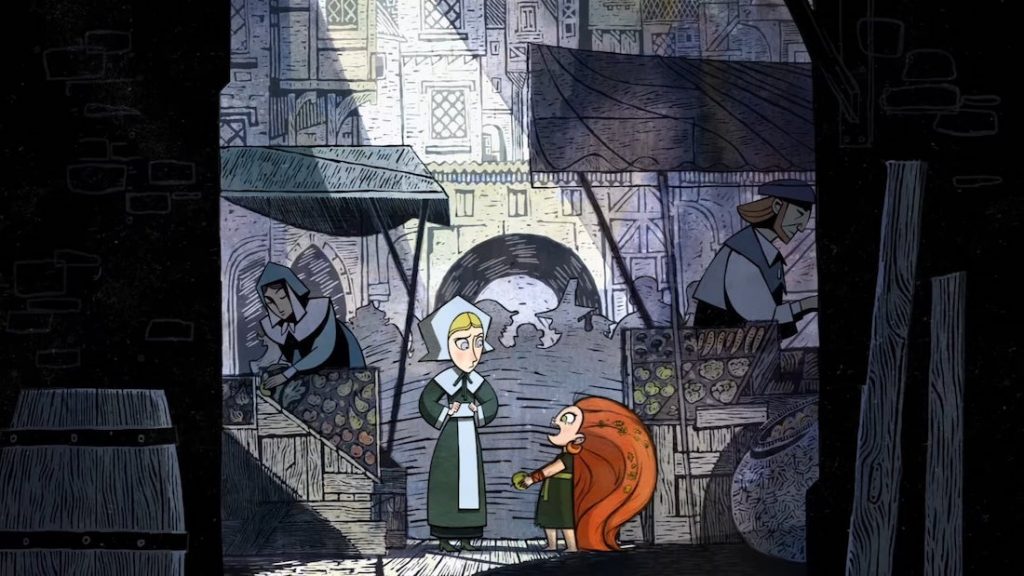
Sean Bean, meanwhile, makes a welcome return with Wolfwalkers as Robyn’s overprotective father, Bill Goodfellowe. There’s an element of uniquely stern vulnerability in his voice performance, and that’s no accident. Bean is utterly prolific at portraying Bill as someone who constantly fears—not just for himself, but also for Robyn—the consequences of disobeying Cromwell’s rules, reflecting the strictness of English colonial hierarchies. As for the Lord Protector himself, Simon McBurney’s portrayal of Cromwell almost evokes the likes of Claude Frollo from Disney’s The Hunchback of Notre Dame (1996) with his sinister vocal presence and his religious motivations. McBurney effectively drives home the fanatical, authoritarian spirit that pushes Cromwell to control both the civilians of Kilkenny as well as the wolves in its forests.
In regards to Wolfwalkers‘ story, it’s easy to claim that the film hits typical narrative themes that other animated movies for young demographics deal with; parent-child conflicts, independence, grief and loss, and so on. The nuances that Wolfwalkers consciously depicts these themes through, however, are rife with deep cultural and mythological context. For one, elements of Irish colonialism are subtly incorporated through the historical context behind Oliver Cromwell and his subjugation of the Irish. Where this plays in narratively, however, is how it becomes the reason why Robyn and Bill, being from England, are treated as outsiders in Kilkenny; to its citizens, they are constant reminders of Cromwell’s dominion. Combine all this with the campaign to purge Mebh and the wolves alongside their rituals and land, and it’s not difficult to piece together what the film’s drawing parallels to.
The standout feature of this film, of course, is the absolutely fantastic animation, elevated by not only its beauty but also by subtleties present in nearly every frame. There’s an incredible usage of geometry and colour present throughout the film, expertly establishing a sense of atmosphere. The walled interior of Kilkenny is covered with deep greys and browns, and its buildings are all constructed with sharp geometric lines—a sharpness that extends not just to the city itself, but also to the people inhabiting it. In contrast, the wolves’ forests are saturated with yellows, greens, and other vivid autumnal colours, outlined through curved, soft sketches that seem almost storybook-esque. Several fade transitions in the film briefly glimpse these various settings sketched out on white paper, a reminder of the sheer amount of work that must have gone into creating this world.
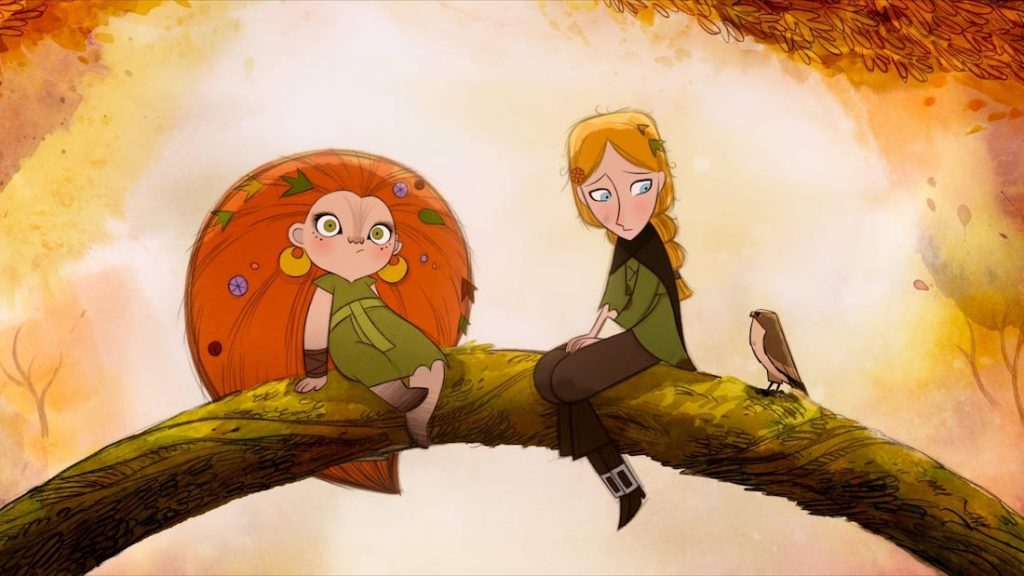
Looking past the impeccably established atmosphere, Wolfwalkers also employs several unique visual devices in specific moments. For instance, painted black bars narrow down the frame for scenes with heightened emotions, and visual motifs, such as the English military’s crimson fires, frequently make an impact throughout the story. The film also vividly displays the sensory changes in Mebh and Robyn’s human-to-wolf transformations, where immersive sound design works in tandem with a misty, colour-coded visualization of a wolfwalker’s point of view. These devices are constantly present in every part of the film, and it’s particularly in the final few minutes where they truly come together, leading to a climax that is as visually staggering as it is cathartic. Rarely have small-scale animated films delivered on both gorgeous animation and a fully realised premise, but Wolfwalkers makes for a refreshing and mature exception.
At the end of the day, all this expert craftsmanship from Cartoon Saloon is in service of a splendid final product, allowing Wolfwalkers to transcend a story that could have been by-the-numbers without proper treatment. It not only depicts nature’s magic with nonpareil beauty and fascination, but also uses its history and mythology to dimensionalize conventional themes about overcoming fear and embracing nature. Wolfwalkers respects the historical and folkloric narratives it draws from while brazenly creating new ground—a rare yet courageous move for one of its hand-drawn kind’s latest works.
IRELAND • LUXEMBOURG • FRANCE • DENMARK • USA • UK | 103 MINUTES | 1.85:1 | COLOUR | ENGLISH

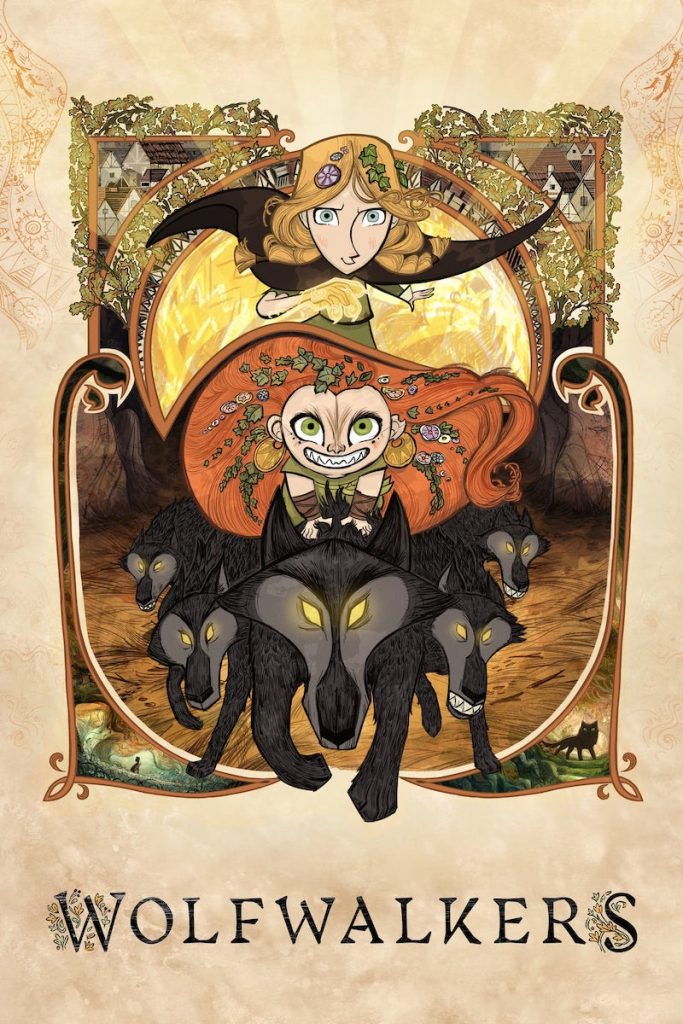
directors: Tomm Moore & Ross Stewart.
writer: Will Collins (story by Tomm Moore & Ross Stewart).
voices: Honor Kneafsey, Eva Whittaker, Sean Bean, Simon McBurney, Tommy Tiernan, Jon Kenny, John Morton & Maria Doyle Kennedy.
